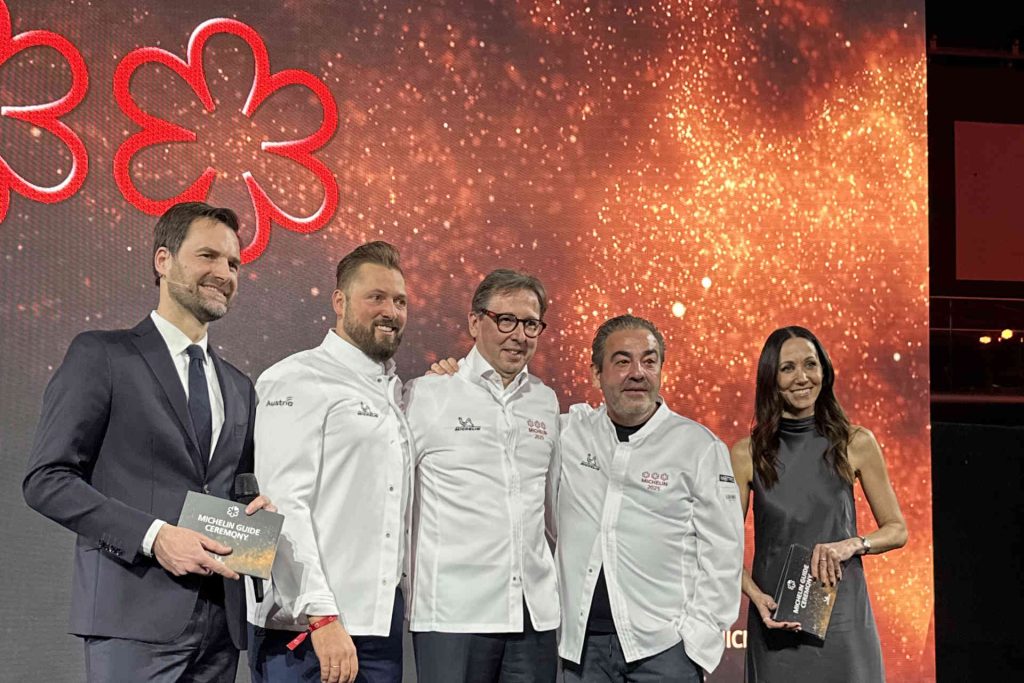
For the first time since 2009, the Guide MICHELIN has evaluated the entire Austrian gastronomy scene, bringing it back into the international spotlight. While in recent years only the cities of Vienna and Salzburg were included, 2025 marks a new era where the entire country shines in culinary brilliance. This comprehensive reevaluation not only honors the exceptional diversity and quality of Austrian cuisine but also reestablishes the Alpine Republic as an indispensable global gourmet destination. A truly extraordinary year that underscores the significance of gastronomy as a cultural and tourism treasure.
The Guide MICHELIN Austria 2025 celebrates Austria’s culinary excellence with an impressive lineup of 82 starred restaurants. From regionally inspired cuisine to innovative fine dining concepts and sustainable gastronomy projects, here is an overview of the most notable winners and their unique culinary highlights.
Highlights of the Awards:
Three Stars: Austria’s Culinary Pinnacle
Two Stars: 18 Restaurants
One Star: 62 Restaurants
Green Stars: 33 Restaurants
Bib Gourmand: 43 Restaurants
Special Awards
The MICHELIN Austria 2025 Guide sets new standards with its ratings and underlines the importance of Austrian gastronomy on the international culinary stage.
The 2025 edition of the Guide MICHELIN not only highlights Austria’s culinary richness but also establishes it as a premier travel and gourmet destination. These diverse awards enhance the Alpine Republic’s international visibility and make it an essential stop for gourmets worldwide. The focus on sustainability, regional products, and innovative gastronomy proves Austria’s ability to harmoniously blend tradition with modernity. The Guide MICHELIN remains an indispensable tool to celebrate and promote the quality and diversity of global gastronomy.

Las Vegas is known for its long nights, which makes places that do mornings really well all the more important. Between the Strip and downtown, there are a surprising number of spots where breakfast and coffee are not just an afterthought, but are deliberately celebrated. It’s these places that make all the difference: quiet, high-quality, and offering just the right amount of enjoyment before the day gets going.
Fine dining, steak, sushi, Mexican cuisine, and Italian dolce vita – Las Vegas has long been more than just buffets and shows. We sampled some of the city’s most exciting restaurants – from complex Chinese flavors and traditional American steakhouses to Japanese presentation and Mexican sensuality.
Las Vegas is spectacle, immersion, and emotion. We’ve experienced some of the city’s most spectacular attractions: from a helicopter flight over the Strip to an immersive art installation and dinner show atmosphere. Here are our personal highlights.


For the first time since 2009, the Guide MICHELIN has evaluated the entire Austrian gastronomy scene, bringing it back into the international spotlight. While in recent years only the cities of Vienna and Salzburg were included, 2025 marks a new era where the entire country shines in culinary brilliance. This comprehensive reevaluation not only honors the exceptional diversity and quality of Austrian cuisine but also reestablishes the Alpine Republic as an indispensable global gourmet destination. A truly extraordinary year that underscores the significance of gastronomy as a cultural and tourism treasure.